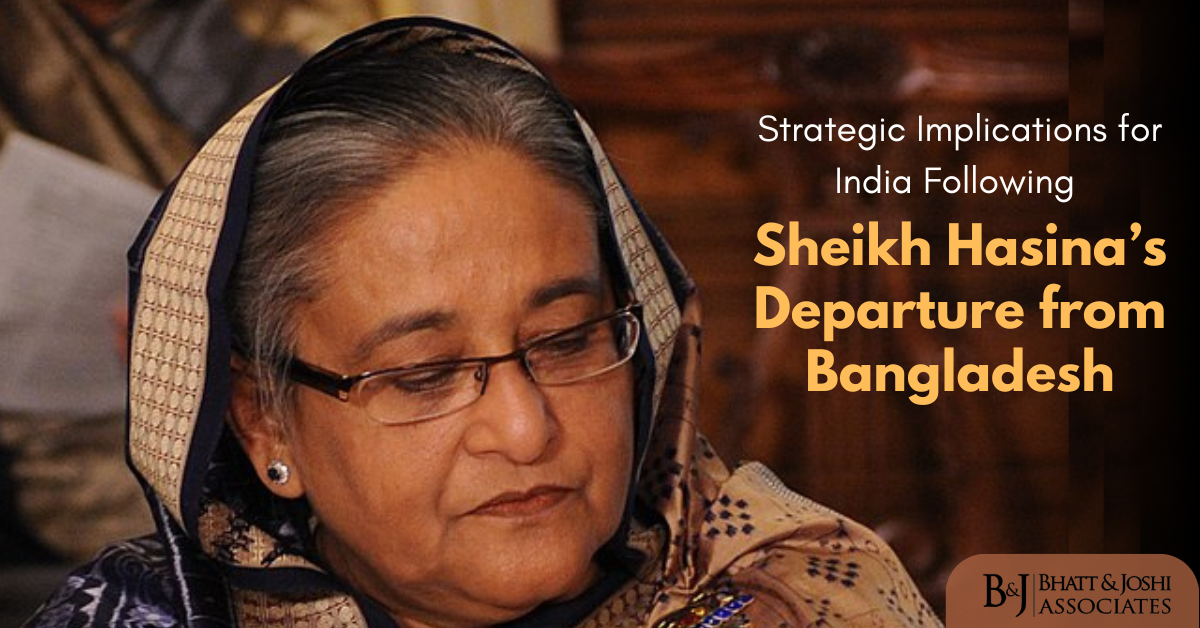
Understanding the Political Crisis
Sheikh Hasina’s Resignation Implications on India
The Bangladesh crisis impact on India includes several important issues that India must deal with after Sheikh Hasina’s resignation, such as political instability, security risks, potential refugee inflows, and economic disruptions.
Political Instability
The sudden power vacuum in Bangladesh poses risks of increased political instability. With the interim government under military control, the direction of Bangladesh’s future governance remains unclear. This instability could potentially invite external influences, particularly from China and Pakistan, which may seek to expand their foothold in Bangladesh, thereby challenging India’s influence in the region.
Security Concerns
Bangladesh has been a crucial ally for India in maintaining security in the northeastern region. The current turmoil might provide opportunities for insurgent groups to exploit the situation, thereby increasing cross-border security threats. Ensuring stability in Bangladesh is essential for maintaining peace and security along India’s eastern frontier.
Refugee Influx
The violent protests and subsequent crackdown have already resulted in significant casualties and displacement. A potential refugee influx into India could strain resources and complicate border management, particularly in states like West Bengal and Assam. Managing this humanitarian aspect will be crucial for India’s regional strategy.
Economic Impact
Bangladesh is a significant trade partner for India. The Petrapole border, a major trade gateway, could see disruptions in business activities due to the political turmoil. This could affect the economic ties that have been bolstered under Hasina’s leadership. Ensuring continuity in trade and economic relations will be vital for India.
Safeguarding India’s Interests
To safeguard its strategic interests, India might consider several proactive measures:
Engagement with the Military
With the Bangladeshi military currently at the helm, India can engage with military leaders to maintain stability and influence the interim government’s policies. This engagement could help in ensuring that the new government remains friendly and cooperative towards India.
Support for Democratic Processes
India should advocate for a swift return to democratic governance in Bangladesh. Encouraging free and fair elections will help stabilize the political environment and ensure that any future government is more representative and democratic, reducing the chances of authoritarian rule.
Strengthening Bilateral Ties
India needs to enhance its diplomatic outreach to various political factions in Bangladesh. By maintaining relationships across the political spectrum, India can ensure that it remains a significant influence in Bangladesh, regardless of which party comes to power.
Monitoring and Humanitarian Aid
India should be prepared to offer humanitarian assistance in response to the unfolding crisis. This could mitigate the impact of any refugee influx and demonstrate India’s commitment to regional stability and humanitarian principles.
Countering External Influence
India must be vigilant against the increasing influence of China and Pakistan in Bangladesh. By providing economic support and development assistance, India can reinforce its position as a key partner, countering any overtures from rival nations.
The Importance of the Teesta River Project
The Teesta River Project is crucial for both Bangladesh and India. The river, originating from the Himalayas, flows through the Indian states of Sikkim and West Bengal before entering Bangladesh, where it is vital for irrigation and agriculture, especially in the Rangpur division. Managing the Teesta’s water resources is a contentious issue, with significant strategic implications.
Geopolitical Rivalry
China’s proposed involvement in the Teesta project has heightened geopolitical tensions. Increased Chinese influence in managing Bangladesh’s water resources could challenge India’s strategic interests, particularly concerning the strategically sensitive Siliguri Corridor.
Strengthening Bilateral Ties
India’s proactive involvement in the Teesta project can help solidify its relationship with Bangladesh. By addressing Bangladesh’s water management concerns, India can position itself as a reliable partner, potentially offsetting Bangladesh’s inclination towards Chinese proposals.
Conclusion
Sheikh Hasina’s resignation marks a significant turning point for Bangladesh, with far-reaching implications for regional stability and India’s strategic interests. By adopting a multifaceted approach that includes diplomatic engagement, support for democratic processes, and strategic interventions like the Teesta River Project, India can navigate the complexities of this crisis to safeguard its interests and promote regional stability.
Reference:
- Bangladesh PM Sheikh Hasina resigns, ending 15 years in power
- How Bangladesh’s student protesters forced Sheikh Hasina from power














